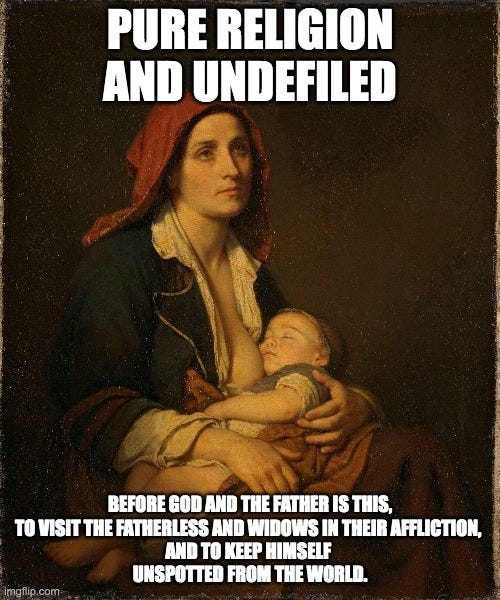Pineapple Pizza
Let me start this post by asking a question: Is pineapple pizza blasphemous? Is it an actively evil thing to put pineapple on pizza?
Let’s think about what we would need to do in order to answer that question. We would have to know what pizza is. And pineapple. We would have to know what ‘evil’ is and ‘blasphemy’. And we would have to have the reasoning power to determine whether the thing called ‘pineapple pizza’ fell within the categories ‘evil’ and ‘blasphemy’. Or whether it was merely ‘disgusting’ or perhaps ‘non-traditional’.
The Definition of Morality
In his marvellous response to my Sushi and Pizza post, Fallible Father tries to make the case that morality is possible without God. Let’s walk through the argument:
I wrote:
First of all, if God doesn’t exist, then there is no such thing as sin. (Note: I did not say if you don’t believe in Him. I said if He doesn’t exist). If God doesn’t exist, barring some replacement I have never seen, then there can be no objective standard of right and wrong that applies to all of us. All there can be is our individual likes and dislikes. You like murdering children, I don’t, well, to each their own.
And depending on if you believe He exists, and what you believe about Him (or your replacement), you will have different beliefs about what is right and wrong.
He replied:
(Von wrote:) Third, without God, there can be no universal basis for right and wrong, nor any basis for truth or relationships at all. (But) I believe that we can make a case for right and wrong, and well educated, intelligent people may do so. This will succeed for some, but will fail for others. Perhaps religion can instill this where logic fails, but one must be careful to avoid the pitfalls. Also, human error is hard to overcome, religious or not.
Now, the first thing to notice is that he misquotes me. He does it very nicely and, I believe, unintentionally, but he does it. I wrote several things, but not quite what he said. So let’s go through what I said, and what I still say:
1) If God doesn’t exist, then there is no such thing as sin
2) If God doesn’t exist, barring some replacement I have never seen, then there can be no objective standard of right and wrong that applies to all of us.
3) All there can be is our individual likes and dislikes. You like murdering children, I don’t, well, to each their own
4) Depending on if you believe He exists, and what you believe about Him (or your replacement), you will have different beliefs about what is right and wrong.
These can be divided and summarised into two parts:
A) The existence of sin (right and wrong) is dependent upon the existence of God (1-3) and
B) Our knowledge of sin is dependent upon our knowledge/belief about God (4)
It seems to me that much of his answer is based on a misunderstanding of (A). For example, he writes:
There are plenty of studies on animals in which morality seems to organically spring up through things like play.
This represents a dramatic misunderstanding of what morality is. Or at least how I am using the word (and how pretty much everyone uses the word outside of certain arguments). Suppose we had two chimpanzee mothers….
-Mother one gives birth and then starts suckling her child. She lovingly cares for him and grieves when he dies at an early age.
-Mother two gives birth, sees that the child is defective, bashes her brains out against a rock, and goes about her business.
Let us note some issues on the definition of morality and Fallible’s post thereon.
1) First of all, neither of these mothers could have learned anything about the morality of giving birth, suckling the child, and caring for the child… through play.
2) The second mother’s actions make perfect sense from the standpoint of her own good from an evolutionary standpoint. It would have been a waste of her time to suckle and care for that child only to have it die before reproducing.
3) We would all be shocked and appalled at the second mother. Justly so. But… why?
The question of morality that divides us is, principally, its definition. Webster’s 1828 defines it as:
MORAL'ITY, noun The doctrine or system of moral duties, or the duties of men in their social character; ethics.
The system of morality to be gathered from the writings of ancient sages, falls very short of that delivered in the gospel.
1. The practice of the moral duties; virtue. We often admire the politeness of men whose morality we question.
2. The quality of an action which renders it good; the conformity of an act to the divine law, or to the principles of rectitude. This conformity implies that the act must be performed by a free agent, and from a motive of obedience to the divine will. This is the strict theological and scriptural sense of morality But we often apply the word to actions which accord with justice and human laws, without reference to the motives form which they proceed.
Now let us note what Webster doesn’t say (because he didn’t need to, everyone at the time would have understood this) and Fallible Father didn’t deal with (because, I would argue, he can’t): Morality is objective. It is external. Webster’s speaks of ‘renders it good’, taking for granted that there exists an external standard of ‘good’ to which the action can conform.
If God exists, then His standards apply to everyone… even that awful chimpanzee mother. If God exists, then He can, and does, communicate His standards to us… and even to the Chimpanzee.
External Standard
Suppose a group of boys are kicking a soccer ball around (or ‘football’, for my non-American friends. Yes, it does make more sense.). And suppose they are shooting goals, and not picking it up with their hands, and doing all the other things that you expect when watching soccer. But then, suppose someone does something you don’t expect. Like tackle (American football sense), one of the other players. “That’s against the rules,” you might say to your friend.
What are you doing? You are appealing to a standard that is external to the boys. Indeed it is external to you and the boys.
But your friend could, quite justly, reply that they aren’t playing soccer. That they have invented some new game which, while it looks quite a bit like soccer, is played by other rules.
In the case of human games, that is perfectly legitimate. You would not be at all offended and might sit and watch this new game for hours.
Is that what morality is? Can each culture invent its own rules, follow its own rules, and expect the rest of us to sit on the stands eating hot dogs (or whatever you Europeans eat while you watch soccer) and cheer? When the one monkey bashed its baby’s brains out, did you admire her invention of a new, and probably successful, set of moral rules? Or did you cringe at this shocking example of immoral behaviour?
When I said that ‘morality can’t exist without God’, I was making the rather obvious claim that an external set of rules, to which we all owe allegiance, cannot exist without an external rulemaker. Duty cannot exist without someone to be dutiful to.
Every one has heard people quarrelling. Sometimes it sounds funny and sometimes it sounds merely unpleasant; but however it sounds, I believe we can learn something very important from listening to the kind of things they say. They say things like this: "How'd you like it if anyone did the same to you?"—"That's my seat, I was there first"—"Leave him alone, he isn't doing you any harm"— "Why should you shove in first?"—"Give me a bit of your orange, I gave you a bit of mine"—"Come on, you promised." People say things like that every day, educated people as well as uneducated, and children as well as grown-ups.
Now what interests me about all these remarks is that the man who makes diem is not merely saying that the other man's behaviour does not happen to please him. He is appealing to some kind of standard of behaviour which he expects the other man to know about. And the other man very seldom replies: "To hell with your standard." Nearly always he tries to make out that what he has been doing does not really go against the standard, or that if it does there is some special excuse. He pretends there is some special reason in this particular case why the person who took the seat first should not keep it, or that things were quite different when he was given the bit of orange, or that something has turned up which lets him off keeping his promise.
It looks, in fact, very much as if both parties had in mind some kind of Law or Rule of fair play or decent behaviour or morality or whatever you like to call it, about which they really agreed. And they have. If they had not, they might, of course, fight like animals, but they could not quarrel in the human sense of the word. Quarrelling means trying to show that the other man is in the wrong. And there would be no sense in trying to do that unless you and he had some sort of agreement as to what Right and Wrong are; just as there would be no sense in saying that a footballer had committed a foul unless there was some agreement about the rules of football
CS Lewis, Mere Christianity
In order for a non-theist to speak of morality they will need to come up with some way of having a universal, objective set of standards that bind all people… or they will need to stop using ‘moral’ in the way the word has always been used. They will have to merely nod at the murderous monkey… and nod at all of the murders that are committed by humans. If there is no external standard, then all standards are just ‘I like’ or ‘I don’t like’.
Just Thanks
Speaking of standards! I read the following in incredulity:
Do we owe something to this Creator? Perhaps, but at best, it strikes me that we owe a “Thank you.”
Indeed I read it several times. He goes on to say:
This is not an academic, theoretical statement. I believe that children owe parents gratitude if they tried, but no undying allegiance until death. Once grown, children should recognize sacrifice and effort, but if the relationship is not mutually beneficial, that is enough. Creating is a decision, being created is not. We are not required to maintain an ongoing interaction simply because parents opted to give birth.
I find this an amazing statement even in the context it was stated, but in the actual context it is amazing!
So let me get this straight: You didn’t exist, and then you did exist, and all you owe for the fact of your existence is ‘thank you’? Now, mind you, that isn’t even what is being proposed, but, wow.
Now let’s add to it. You were created… and you are being sustained. If God stopped supporting you right now, you would cease to exist right now. And all you owe is a ‘thank you’?
Let’s keep going. You were created, and you are being sustained, and everything around you is also due to God’s work. The food you eat, the water you drink, the air you breathe, your wife, your children, your job, your car, your favourite baseball glove… those were all created and are being sustained by God… and all you owe is a ‘thank you’? At best?
You are living in His house. Every breath of your existence is in His universe. Most of us teach our children ‘my house, my rules’, and at the very least, we teach it when they go visiting friends. But you think you owe no obedience to the God whose universe you are living in?
The Effect of Religion
Methinks my second point has just been made. The Christian religion states that you owe far, far more than just ‘So long, and thanks for all the fish’. Indeed, I can’t really imagine a religion with a creator that doesn’t require rather dramatically more than that. Indeed, even the pagan religions that merely speak of great powers (battling it out with each other and committing adultery with each other’s wives) think you owe more than that!
So your lack of religion shows here. The point comes to the fore that what we believe in the ‘religious’ area affects what we believe in every area, but especially right and wrong.
Pineapple Pizza
Well, Fallible covered a lot of issues in his post, and I am just dealing with one of them here. The overall question that we are discussing has to do with Pizza and Sushi… is a belief in God or not, this god or that one, like choosing between pizza and sushi?
And my answer is, ‘much in every way’. Or, translated, no. Choosing between pizza and sushi is, for the most part, a minor, trivial, unimportant choice. (Unless you get indigestion at night, then pizza is probably out). Choosing between God or not, this religion or not, is incredibly important. Life changingly important.
But in this post, I did not discuss the belief but the reality. The ground underneath the belief. Specifically the issue of ‘morality’. Of right and wrong. Of sin and righteousness. Unless there is an external lawmaker, there can be no objective laws. We can stop playing soccer and make up our own rules, but can we change the rules of life?
If it is written in the laws of the universe, that ‘thou shalt not put pineapple on pizza’, then to do so is a sin. If it is written, ‘thou shalt not commit adultery’, then ‘open marriage’ is a sin. If it is written ‘male and female, created He them’, then transgenderism is a sin.
If nothing is written, if nothing is objective, if nothing is external, then nothing is a sin. It is all just a preference. Pineapple on pizza, your wife sleeping with another man, your daughter having her breasts cut off… just a preference. Pizza or sushi. That is where that path leads.
I love comments and would love to have more people join in the discussion!
Congratulations!
If I understand correctly, congratulations. Fallible Father has added to his fatherhood… or, rather, the new addition has made her entry into the cold, cruel world :)
May God bless him with many more… spoken from my religious viewpoint :)
Thank you for reading Von’s Substack. I would love it if you commented! I love hearing from readers, especially critical comments. I would love to start more letter exchanges, so if there’s a subject you’re interested in, get writing and tag me!
Being ‘restacked’ and mentioned in ‘notes’ is very important for lesser-known stacks so… feel free! I’m semi-retired and write as a ministry (and for fun) so you don’t need to feel guilty you aren’t paying for anything, but if you enjoy my writing (even if you dramatically disagree with it), then restack, please! Or mention me in one of your own posts.
If I don’t write you back it is almost certain that I didn’t see it, so please feel free to comment and link to your post. Or if you just think I would be interested in your post!
Thanks again, God Bless, Soli Deo gloria,
Von
Links
Sushi, Pizza, and the Existence of God
So Fallible Father and I have agreed to a letter exchange. It started when he posted a post entitled ‘Religion’ and specifically comes from this line: “Arguing over religion strikes me as the same as arguing over whether sushi or pizza is better.” Regardless of how you feel about Sushi or Pizza (I happen to like both, although I’m not sure I would like …












Well written. I am going to have to ponder some of this a bit, but look forward to seeing where my thoughts take me!
I am enjoying this a lot!
There can be no true objective morality without God (or some other superhuman authority/standard). But if we instead talk not of morality but of human flourishing we can get closer to an objective metric. There is still debate about what exactly that is and short term/long term and the utilitarian value of rights and norms but those are debates about the details. Anyone who claims that there is no objective pleasure or pain, happiness or suffering, is not being honest. Appealing to God is ultimately arbitrary anyway, unless you assume the question and claim that scripture is his will. Using a standard of long term and collective human happiness as an objective standard can recreate a morality as consistent and robust as any other. Ultimately all morality is partly consequentialist. No one ever says "this norm or standard is horrible for people and will greatly increase human suffering but it's still he right thing to do". Rather, debates seem to be more about utilitarian/deontological an short term/long term.